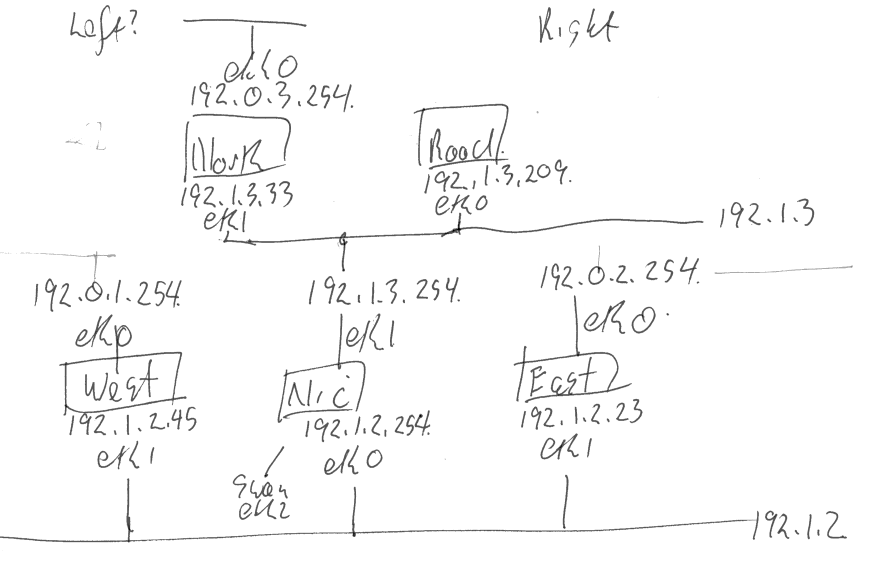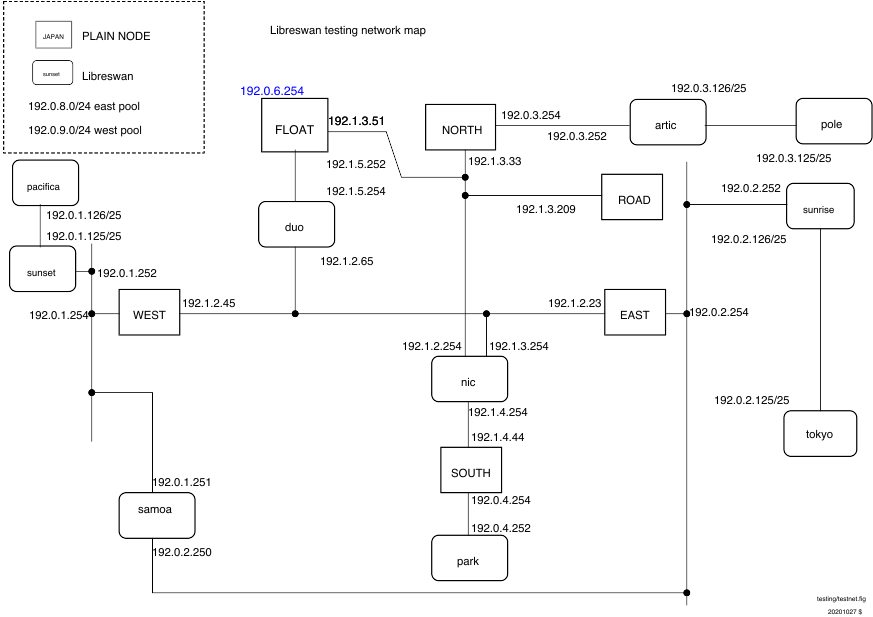Test Suite
Nightly Test Tesults
Libreswan's testsuite is run nightly. The results are published here, with the most recent result here. The tests are categorized as:
- good: these tests are expected to pass (unfortunately, some still have timing problems and occasionally fail)
- wip: these tests require further work, for instance the result may not be deterministic, or the bug they demonstrate hasn't yet been fixed
- skiptest: these tests require manual intervention to run
To run tests locally, read on.
Running tests
The libreswan tests, in testing/pluto, can be run using several different mechanisms:
| Framework | Speed | Host OS | Guest OS | initsystem testing (systemd, rc.d, ...) | Post-mortem | Interop testing | Notes |
|---|---|---|---|---|---|---|---|
| KVM | slower | Fedora, Debian (BSD anyone?) |
Alpine, Fedora, FreeBSD, NetBSD, OpenBSD, Debian | yes | shutdown, core, leaks, refcnt, selinux | strongswan (Linux, FreeBSD), iked (OpenBSD), racoon (NetBSD), racoon2 (NetBSD) | gold standard ideal for BSD builds idea for testing custom kernels used by the Testing machine requires 9p (virtio anyone?) |
| Namespaces | fast | linux | uses host's libreswan, kernel, and utilities | no | core, leaks | strongswan (linux)? | ideal for quick tests requires libreswan to be built/installed on the host requires all dependencies to be installed on the host test results sensitive differing kernel and utilities |
| Docker | linux | uses host's kernel uses distro's utilities |
? | ? | ? | ideal for cross-linux builds (CentOS 6, 7, 8, Fedora 28 - rawhide, Debian, Ubuntu) sensitive to differing kernel and utilities |
How tests work
All the test cases involving VMs are located in the libreswan directory under testing/pluto/. The most basic test case is called basic-pluto-01. Each test case consists of a few files:
- description.txt to explain what this test case actually tests
- ipsec.conf files - for host west is called west.conf. This can also include configuration files for strongswan or racoon2 for interop testig
- ipsec.secret files - if non-default configurations are used. also uses the host syntax, eg west.secrets, east.secrets.
- An init.sh file for each VM that needs to start (eg westinit.sh, eastinit.sh, etc)
- One run.sh file for the host that is the initiator (eg westrun.sh)
- Known good (sanitized) output for each VM (eg west.console.txt, east.console.txt)
- testparams.sh if there are any non-default test parameters
Once the test run has completed, you will see an OUTPUT/ directory in the test case directory:
$ ls OUTPUT/ east.console.diff east.console.verbose.txt RESULT west.console.txt west.pluto.log east.console.txt east.pluto.log swan12.pcap west.console.diff west.console.verbose.txt
- RESULT is a text file (whose format is sure to change in the next few months) stating whether the test succeeded or failed.
- The diff files show the differences between this testrun and the last known good output.
- Each VM's serial (sanitized) console log (eg west.console.txt)
- Each VM's unsanitized verbose console output (eg west.console.verbose.txt)
- A network capture from the bridge device (eg swan12.pcap)
- Each VM's pluto log, created with plutodebug=all (eg west.pluto.log)
- Any core dumps generated if a pluto daemon crashed
- testing/baseconfigs/
- configuration files installed on guest machines
- testing/guestbin/
- shell scripts used by tests, and run on the guest
- testing/linux-system-roles.vpn/
- ???
- testing/packaging/
- ???
- testing/pluto/TESTLIST
- list of tests, and their expected outcome
- testing/pluto/*/
- individual test directories
- testing/programs/
- executables used by tests, and run on the guest
- testing/sanitizers/
- filters for cleaning up the test output
- testing/utils/
- test drivers and other host tools
- testing/x509/
- certificates, scripts are run on a guest
Network Diagram
- interface-0 (eth0, vio0, vioif0) is connected to SWANDEFAULT which has a NAT gateway to the internet
- the exceptions are the Linux test domains: EAST, WEST, ROAD, NORTH; should they?
- the BSD domains always up inteface-0 so that /pool, /source, and /testing can be NFS mounted
- NIC needs to run DHCP on eth0 manually; how?
- transmogrify does not try to modify interface-0(SWANDEFAULT) (doing so would break established network sessions such as NFS)
- the interface names do not have consistent order (see comment above about Fedora's interface-0 not pointing at SWANDEFAULT)
- Fedora has ethN
- OpenBSD has vioN (different order)
- NetBSD has vioifN (different order)
LEFT RIGHT
192.0.3.0/24 -------------------------------------+-- 2001:db8:0:3::/64
|
2001:db8:0:3::254
192.0.3.254(eth0)
ROAD NORTH
192.1.3.209(eth0) 192.1.3.33(eth1)
2001:db8:1:3::209 2001:db8:1:3::33
| |
192.1.3.0/24 -----+----------------+--------------+-- 2001:db8:1:3::/64
|
2001:db8:1:3::254
192.1.3.254(eth2)
NIC---swandefault(0)
192.1.2.254(eth1)
2001:db8:1:2::254
|
192.1.2.0/24 ---+------------------+-------------+--- 2001:db8:1:2::/64
| |
2001:db8:1:2::45 2001:db8:1:2::23
192.1.2.45(eth1) 192.1.2.23(eth1)
WEST EAST
192.0.1.254(eth0) 192.0.2.254(eth0)
2001:db8:0:1::254 2001:db8:0:2::254
| |
| TEST-NET-1
| 192.0.2.0/24 ----+--- 2001:db8:0:2::/64
|
192.0.1.0/24 ---+------------------------------------ 2001:db8:0:1::/64
Problems with the existing Network
The current network has a number of limitations. This section identifies those problems and proposes changes to address them:
- the gateway had only 128 DHCP addresses
- public networks are being used: 192.0.1.0/24 is owned by elevatedcomputing.com; 192.1.2.0/24 is owned by raytheon.com; 192.1.3.0/24 is owned by raytheon.com
- 192.168.234.0/24 (gateway) is reserved for private use networks and known to clash with toronto airport
- using public interfaces means that they can't be used in documentation
- can't test two hosts where each is behind a gateway VPN
see Ref https://www.rfc-editor.org/rfc/rfc5737 https://www.rfc-editor.org/rfc/rfc3849 https://www.rfc-editor.org/rfc/rfc6890
The suggestion is:
- use the benchmarking network 198.18.0.0/15
- reserve 198.19/16 for the gateway
- revive [sun]RISE (behind EAST) and [sun]SET (behind WEST)
- reserve a number N for each machine / network: EAST: 23; WEST: 45; RISE: 123; SET: 145; NORTH: 33; NIC: 254
- use 198.18.2N.N/24 for IPsec Interfaces
- use 192.18.1N.1N/24 for RISE and SET
LEFT RIGHT
198.18.254.0/24 ----------------------------------+-------------- 2001:db8:254::/64
|
2001:db8:254::254
198.18.254.254(eth0)
ROAD NORTH
198.18.3.209(eth0) 198.18.3.33(eth1)
2001:db8:3::209 2001:db8:3::33
| |
198.18.3.0/254 --------+----------------+---------+---------------- 2001:db8:3::/64
|
2001:db8:3::254
198.18.3.254(eth2)
NIC---swandefault(0)
198.18.2.254(eth1)
2001:db8:2::254
|
|
198.18.2.0/24 ----------------+---------+-----------------+-------- 2001:db8:2::/64
| |
2001:db8:2::45 2001:db8:2::23
198.18.2.45(eth1) 198.18.2.23(eth1)
192.18.245.45/24(ipsec1)--$(OS)W ${OS}E--198.18.223.23/24(ipsec1)
WEST EAST
198.18.145.45(eth0/2) 198.18.123.23(eth0/2)
2001:db8:145::45 2001:db8:123::23
| |
| |
| 192.18.123.0/24 ------+---+-- 2001:db8:123::/64
| |
| 2001:db8:123::123/64
| 198.18.123.123/24(if1)
| ${OS}RISE
| 2001:db8:1::123/64
| 198.18.1.123/24(if1)
| |
198.18.145.0/24 ----------+---+------ 2001:db8:145::/64 |
| |
2001:db8:145::145/64 |
198.18.145.145/24(if1) |
${OS}SET |
2001:db8:1::145/64 |
198.18.1.145/24(if1) |
| |
198.18.1.0/24 ------------+-----------------------------------+----- 2001:db8:1::/64
The changes are as follows:

